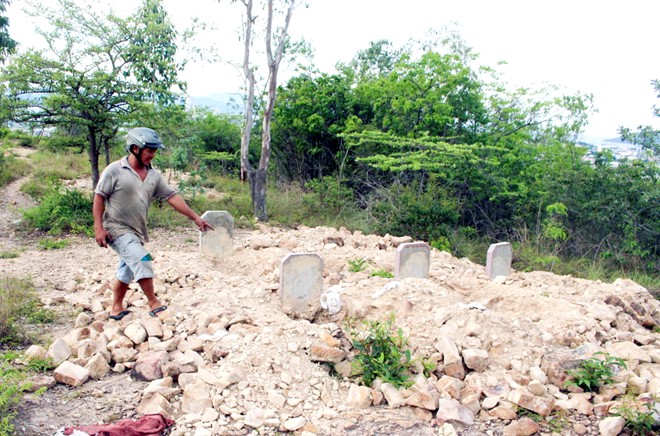VietNamNet Bridge - Deputy Prime Minister Truong Hoa Binh has asked the Ministry of Public Security, the authorities of Khanh Hoa Province and related agencies to investigate the secret resettlement of 134 graves in Phuoc Dong commune, Nha Trang city, which has stirred up the local community.

Local newspapers have reported that many families in Phuoc Dong commune of Nha Trang city were very angry and puzzled when they found out that the tombs of their family members in Hon Ro area had disappeared.
They went to the People’s Committee of Phuoc Dong Commune asking to clarify the case.
It turned out that the investor of a construction project in Hon Ro secretly removed up to 134 tombs in this area without informing the owners of the tombs.
The investor – Thanh Truc Co., Ltd. - said they had removed the tombs with the consent of the local authorities.
Meanwhile, the local government said they had informed local people whose family members’ tombs were located in Hon Ro area, which was allocated to Thanh Truc Company, via the public loudspeaker system to come to the commune People’s Committee to complete procedures to remove the graves.
By the deadline announced via the public loudspeaker, no family met with authorities to fulfill the procedures so the investor was permitted to remove the tombs to another place, the local government said.
Some 134 urns were moved to a cemetery in the north of the city, without any name tags or identification marks to help the families recognise which urn was of their deceased relative.
“My family has one grave removed to the new cemetery but when we went there, they (Thanh Truc Company) showed us five urns,” a local said.
Some were given a new grave at the cemetery. But their next of kin said these were kind of makeshift tombs with only a gravestone standing on a pile of broken bricks and rocks. The families also doubted if their loved ones were truly lying under those new so-called graves after the removal.
Local people asked the company to make ADN test for all remains to accurately identify them and to cover the construction cost of the new tombs.
Infringements of graves and remains are subject to criminal charges in Vietnam, and violators might face up to five years in prison if it leads to serious consequences, according to Article 246 of the Penal Code.
Linh Nhat